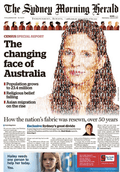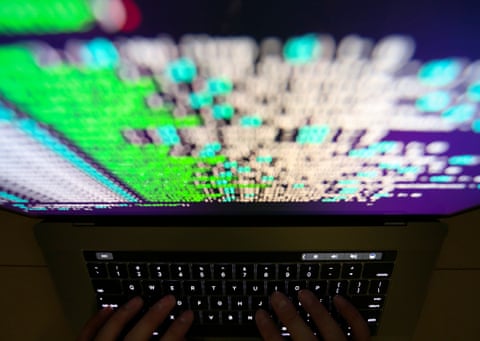Good morning, this is Eleanor Ainge Roy bringing you the main stories and must-reads on Wednesday 28 June.
Top stories
A ransomware cyber-attack has hit Europe and parts of the US, with those affected unable to access their computers even when they pay the ransom of $300. The Ukraine government, banks and electricity grid have been hardest hit by the “Petya” ransomware, but companies in France, Denmark, Pittsburgh and Pennsylvania have also been attacked, including shipping company Maersk and food giant Mondelez. Analysts at cybersecurity firm Kaspersky Labs said they had traced the infections to “a new ransomware that has not been seen before”.
The attack was first reported in Ukraine, where its government, banks, state power utility and Kiev’s airport and metro system were badly affected. The radiation monitoring system at Chernobyl was taken offline, forcing employees to use hand-held counters to measure levels at the former nuclear plant’s exclusion zone. The total number of those affected is not yet known. Nicolas Duvinage, head of the French military’s digital crime unit, told Agence France-Presse the attack was “a bit like a flu epidemic in winter”, adding: “We will get many of these viral attack waves in coming months.”
Bill Shorten has pledged to legislate to restore cuts to Sunday penalty rates of between 25% and 50%, due to come into effect on 1 July. He told the Australian Council of Trade Union’s 90th anniversary dinner that a Labor government would pass legislation to restore the cuts made by the Fair Work Commission to the retail, fast food, hospitality and pharmacy awards, a move that would affect 700,000 workers from the time legislation was passed.
Australia’s most disadvantaged schools receive, on average, twice the funding per student than schools in the least disadvantaged areas – but the money rarely results in better outcomes, a new education report has found. The difference between results in east coast cities and the rest of the country is so vast that the most disadvantaged 10% of children in the Australian Capital Territory are on par with the most advantaged 10% in the NT.
Donald Trump’s lawyer’s firm steered millions of dollars to family members, documents sighted by the Guardian show. In June 2009, Jay Sekulow, who is now an attorney to Donald Trump, approved plans to push poor and jobless people to donate money to his Christian nonprofit organisation, Christian Advocates Serving Evangelism, which since 2000 has steered more than $60m to Sekulow, his family, their businesses and unusual loans and property deals.
The Australian writer Helen Dale has been called out for plagiarism again, this time from Facebook and Twitter. Dale, also known as Helen Demidenko or Helen Darville, is author of The Hand that Signed the Paper and won the Miles Franklin Literary award in 1995. She was found to have fabricated a Ukrainian family history and father for herself to help publicise the novel, and defend it against charges of anti-semitism. Now, more than 20 years later, she appears to have been pinching witty lines from US podcaster PJ Vogt and passing them off uncredited as her own.
Sport
The Hurricanes and the British and Irish Lions ended a frantic, uneasy game in a 31-31 draw last night in Wellington. Four days out from the second test match against the All Blacks, Lions coach Warren Gatland is being critcised for calling up squad replacements but then not playing them.
Team New Zealand, the new holders of the Auld Mug, were the faster, more reliable boat at the America’s Cup in Bermuda but there were other factors at play in their epic victory over Team USA, not least their employment of “cycle grinders”.
Thinking time

Why do the middle class need a safe, distant lens to empathise with the poor? Bridie Jabour reviews the new SBS documentary, reality-television hybrid Filthy Rich and Homeless, which follows five affluent Australians “living among the homeless” for 10 days in Melbourne. Despite the ham-fisted concept there are some sensitive moments.
Let Guardian Australia navigate you through the findings of the Australian census. Census day yesterday provided a plethora of rich data, and our data team has pulled together two fascinating interactives. You can see how your town or suburb has changed over the last 10 years, and check out the results on our special census map. Plus, here’s some surprisingly intimate details about the changing lives of Australians, including an 81% increase in same-sex couples in the last decade; that the ACT is the fastest-growing state or territory; and women still do more housework than men – typically 14 hours a week compared with five for men.
Do doctors need to talk to their patients more about obesity? Guardian Australia’s columnist and oncologist Ranjana Srivastav explores why doctors can feel uncomfortable broaching weight issues with their increasingly large patients, particularly when doctors themselves may fall into the same traps of over-eating and convenient junk food which plague so many Australians.
Media roundup

The Sydney Morning Herald reports on a failed education provider that left more than 5,000 students without the qualifications they paid for. The Canberra Times reports that people in the ACT are younger, earn more and marry less, as the capital recorded the largest population growth out of all states and territories in yesterday’s census release. The ABC has a long read explaining how Uluru formed, and why the famous rock is so distinctively red.
Coming up
Former Northern Territory corrections minister and children and families minister John Elferink is due to appear at the royal commission on juvenile detention.
ACTU secretary Sally McManus and president Ged Kearney close the ACTU NexGen organising conference.
Sign up
If you would like to receive the Guardian Australia morning mail to your email inbox every weekday, sign up here. And you can also get the latest headlines by signing up for our Guardian Today email, published every day at noon.
